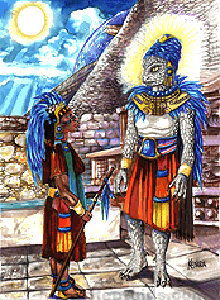Nadya and I are now planning what to do with them during their stay with us. After all, we're not only their friends, but we're their guides to the great American Southwest while they are here.
So, Nadya says to me, "I don't want you spending all your time back in your writing room with the door closed all day while they're here."
After all, I don't have much to do this summer: teach three college classes and prepare for SCBWI-Los Angeles and finish two novel projects. Not much at all!
In my witty, quippy manner I responded, "I'll leave my door opened."
Nadya gave one of those wifey looks that told me that retort was not the response she wanted to hear.
I then said, "If I had to got to work at an office with set hours, would you tell me not to go to work?"
She compromised. "Don't stay in your writing room all day."
"I won't. You know I'm up early (4:30 AM) , so I'll get my writing done by 10 or 11, and then I'll be the perfect host and guide."
She just looked at me with that wifey "I'll believe it when I see it" look.
When people meet me at conferences or workshops they exclaim how they could never get up so early to write. They ask me what time I go to bed. Usually between 9 and 12 PM, I respond.
I spent many years playing at being a writer. I'd use all the excuses one uses not to write, the same ones many writers I meet at conferences and workshops use to tell me why they cant' get up at 4:30 AM or tell me why they haven't written in a couple of days or a couple of weeks or a couple of months. Egad.
I wasted much, much time.
And now, I'm older. Much, much older than when I sold my first novel.
I don't feel I've moved forward much, though.
So, I'm up at 4:30 AM to write. Not to make up for what I consider lost time, but to put in the time I have left to move forward in my writing career.
Still waters may run deep but they also attract mosquitoes and other unwanted pests.
Mosquitoes--what a marvelous metaphor for those pesky little guilty reminders that I'm not writing when I should be writing, I'm doing what I should be doing!
Writing requires a rigorous, disciplined schedule.
Inspiration is fine as a catalyst, but inspiration, like all bright flames burns out all too quickly.
The "inspired" writer throws everything he has into his "present"project--until the inspiration burns out.
Then he's left all alone wondering, "What now? I'm no longer inspired. This is becoming work. Hard work."
And the writing stops. The waters become still. Mosquitoes appear. A sense of lostness and failure swarm the writer, sucking the writer's blood from his soul.
The vast majority of successful writers have a set time to write, have a set number of pages/words/hours to produce per day/week/month, and who treat writing much as their jobs, their businesses:
---being on time
---consistent schedule
---not missing days of writing because of "moodiness" or the drama of our daily lives
---ignoring the small demons of distraction (email, cells, Facebook, Twitter, Yahoo Groups, chat rooms, et cetera)
---working hard during the shift to produce a quality (and even quantity of) product
---and leaving satisfied at having put in a highly productive day.
---consistent schedule
---not missing days of writing because of "moodiness" or the drama of our daily lives
---ignoring the small demons of distraction (email, cells, Facebook, Twitter, Yahoo Groups, chat rooms, et cetera)
---working hard during the shift to produce a quality (and even quantity of) product
---and leaving satisfied at having put in a highly productive day.
And because they have been so productive and successful, they are able to concentrate on other activities other than work (writing) : family, friends, hobbies, networking, et cetera.
Am I slow burning, a-light-by-night oil or am I blinding-flash-gone-in-seconds gasoline?
Isn't writing, after all, first a job, a business, a profession?
I've sold 14 books for children and young adults, and I did it by not being inspired but by working hard and disciplining myself to work on those days when I didn't want to work at all, especially after a trying day of teaching, a bit of tiff with the wife, mowing the yard, cleaning dog poop from the grass, and getting a bill I hadn't expected to be as large as it was.
By getting up at 4:30 AM.
The success of writing is nothing more than blood, sweat, and tears, the hardest job you'll ever love.
Just ask Debbie Macomber, who spent twelve years failing, almost losing the love of her life, toeing at the precipice of quitting more than once, sending her children to school in unfashionable clothes, and eating a lot of bologna.
Debbie didn't go from Zero books published in Oklahoma to 60 million books published world-wide by relying on her adrenaline alone: writing was the job she was born to do, and to do anything else would be to defy nature and God.
The glamor of the business of writing is in doing the job of writing itself--persistent writing that will pay off one way or another.
Thoughts?
See you on the bookshelves.
Larry Mike Garmon































